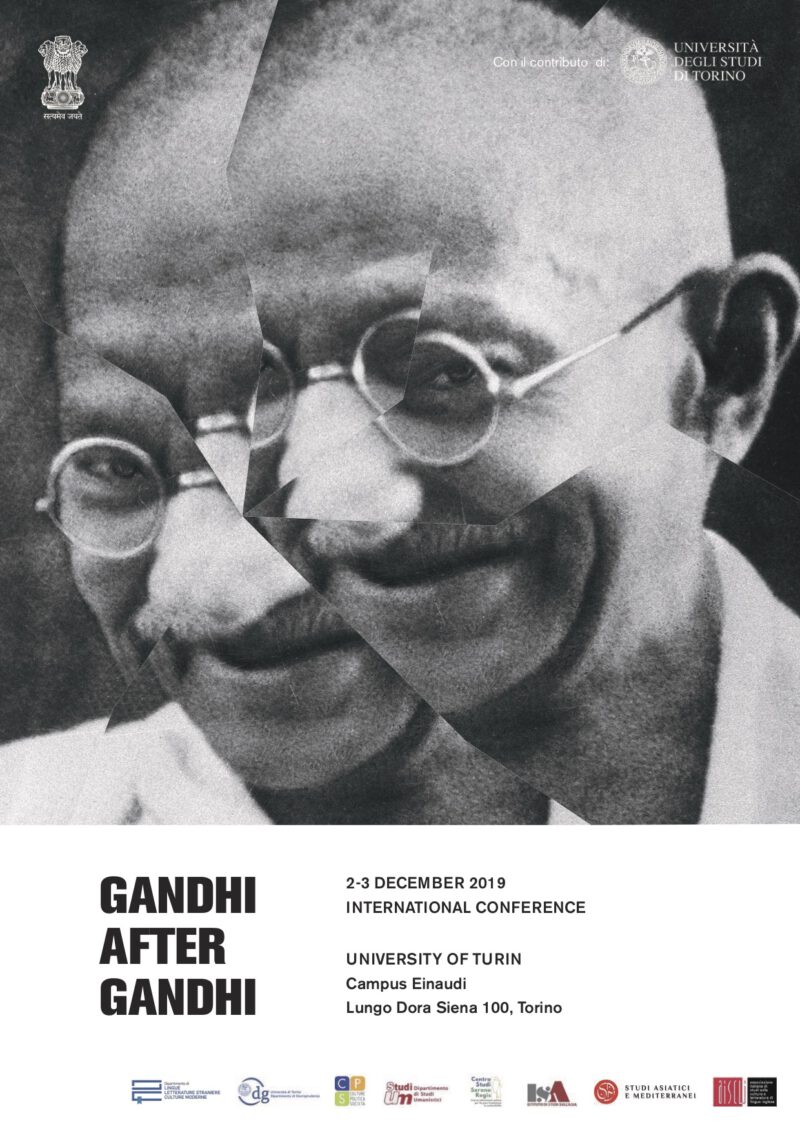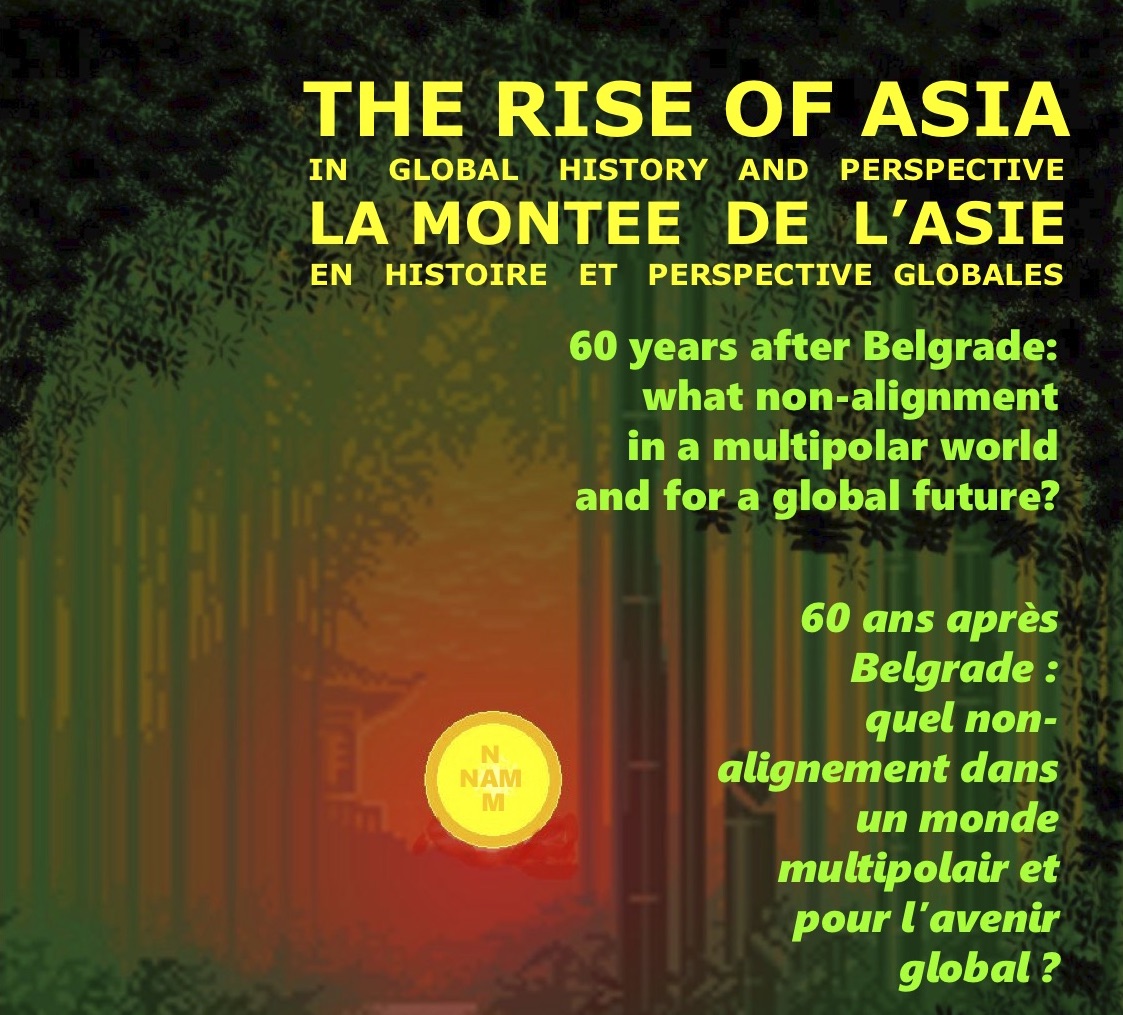GANDHI AFTER GANDHI – International Conference

PROGRAMME
2 December Aula Magna
- 9:30-10:00 Welcome and opening
- 10:00-11:30 Keynote Lecture: Shruti Kapila Gandhi and the Truth of Violence
- 11:30-12:00 Break
- 12:00-13:30 Giuliano Pontara “Gandhi, nonviolenza e giustizia sociale” in dialogo con Anna Bravo
- 13:30-14:30 Lunch break
14:30- 16:00
ROOM H6 Panel 1 Gandhian grass root movements and their experiences I
- F. Lovisolo Environmental and social sustainability according to the Gandhian vision as implemented by ASSEFA India
- Vijay Singh Negi In pursuit of traditional farming, farmers and our food systems
- Jagyoseni Mandal The Mahatma’s visionary critique of industrialization/ The western civilization in the light of India’s globalized economy today : heading towards a devastating future?
- Shankar Ramaswami The Alternative Politics of Migrant Workers in Delhi
ROOM H7 Panel 2 Gandhian peace and civil rights movements in a global dimension I
- Massimiliano Vaghi Note sulle reti imperiali britanniche nell’Oceano indiano (1860-1914): i “coolies” indiani in Sudafrica e la politica di Gandhi
- Carmen Concilio Gandhi and South Africa
- Chiara Corazza Gandhi e il movimento panafricanista (1919-1945)
- Ritu Gairola Khanduri Gandhi Going Global: Nation, community, diaspora in the US and South Africa
16:00-16:30 Coffee break
16:30-18:00
ROOM H6 Panel 3 Gandhian grass root movements and their experiences II
- Elsa Bianco, Giuseppe Barbiero, Mariella Bo La pratica del silenzio attivo e lo sviluppo di swaraj. Una scuola di nonviolenza
- Pietro Moretti Nonviolenza e disabilità
- Renu Nanda Gandhian Technological Innovative Pedagogical Interventions for Female Education: An experiment in Jammu district of Jammu and Kashmir State in India
- Laura Colucci-Gray, Donald Gray, Elena Camino The Earth as integral dimension to ‘development’: reflecting on the educational potentialities of Gandhi’s message in a school gardening project
ROOM H7 Panel 4 Gandhian peace and civil rights movements in a global dimension II
- Andrea Carosso “Stride Toward Freedom”: Martin Luther King, the Montgomery Bus Boycott and the Gandhian Lesson
- Nishant Bhardwaj Revisiting ‘ahimsa’ in a divided world
- Hyun Höchsmann Non-violence as Universal Love in Gandhi and Mozi
- Monica De Togni Was There Any Chinese Gandhi? Political Pacifist Participation and the 1948 National Assembly
20:00 Dinner
3 December
9:30-11:00
ROOM H6 Panel 5 Gandhian political view, experience and legacy past and present I
- Annie Devenish The sensual Gandhi
- Eijiro Hazama Rethinking Gandhi’s “Secularism”: How Gandhi’s Brahmacarya Related to His Last Political Vision
- Amitendu Bhattacharya A ‘National Diet’ for the Indians: Gandhi and the Phenomenon of Muscular Nationalism
- Mario Prayer Khadi after Gandhi
ROOM H7 Panel 6 Gandhian political view, experience and legacy past and present II
- Antonino Drago Non violenza: chi, come, verso che?
- Sagnella-Bitossi L’eredità di Gandhi nell'”esperienza religiosa” di Aldo Capitini
- Gloria Germani L’importanza del pensiero di Gandhi per la sopravvivenza del pianeta e dell’uomo
- Louis Campana Approches d’une économie non-violente
11:00-11:30 Coffee break
11:30-12:30 AULA MAGNA Lectio Magistralis: Michelguglielmo Torri The Mahatma Gandhi and the Muslims: Gandhi’s role in making India’s partition inevitable
12:30-13:30 Lunch break
13:30-15:30
ROOM H6 Panel 7 Understanding Gandhi in today’s times: legacy, philosophy, and the present
- Kamila Junik-Łuniewska Gandhi in contemporary Hindi writing
- Roshni Sengupta From political icon to Mahatma: the visual turn in portrayal of Gandhi in Indian cinema
- Pralay Kanungo Hindu Nationalists and Mahatma Gandhi
- Rohit Wanchoo Rethinking Gandhi and Non-Violence Today
- Sanjukta Das Gupta Gandhi and Adivasis: Post-Independence re-imaginations
ROOM H7 Panel 8 Gandhian political view, experience and legacy past and present III
- Franco Manni “Mazzini’s Influence and Gandhi’s legacy on Family Duties against Corruption”
- Alessandro Vescovi Gandhi in Raja Rao’s Kanthapura (1938)
- Ahyaan Raghuvanshi Loving Oneself through Others. The Political Philosophies of Savarkar and Gandhi
- Jacek Skup Gandhi and Bose
- Kumar, Pratyush Gandhi’s Law
15:30-16:00 Coffee break
ROOM H6 Panel 9 Gandhian political view, experience and legacy past and present IV
- Parmeet Kajal Gandhi versus Gandhi: A comparative study of his thoughts in his English and Vernacular
- Rachna Sharma Newspapers
- Dezs Szenkovics Exploring the legacy of Gandhian ethics in journalism in the era of post truth: a critical Analysis Gandhi’s Economic Thought: Is It Still Relevant?
- Pallavi Varma Patil + Roshni Ravi Nai Taleem
- Punsara Amarasinghe Deconstructing “Swaraj” as the Mahatma Gandhi’s political idealist reflection of anarchism
ROOM H7 Panel 10 Gandhian political view, experience and legacy past and present V
- Inês Raquel Cambé Duque + Piyush Bhatti Gandhi’s model of decentralisation
- Marzia Casolari Partitions and beyond: Gandhi’s views on India’s and Palestine’s partitions
- Farooq Ahmad Dar Gandhi and the Creation of Pakistan
- Alessandra Consolaro + Tommaso Bobbio Modi and Gandhi
17:30-18:00 General discussion and closing remarks
Click here to download the PDF programme







































